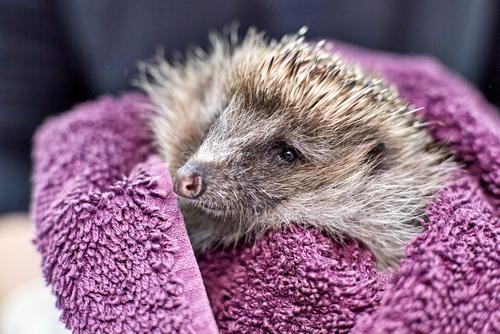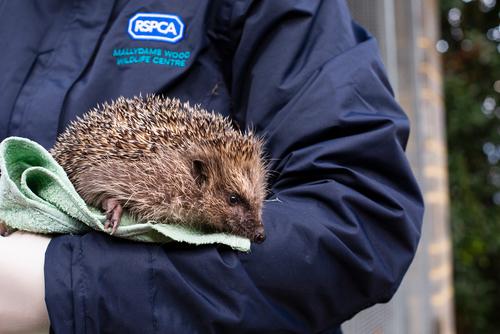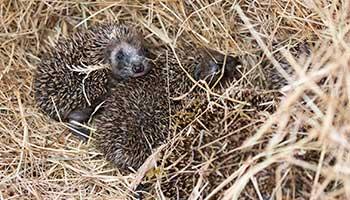Sick or injured hedgehogs
Hedgehogs are nocturnal and will hunt at night when their prey is most active. You might see one during the day if their nest has been disturbed or if they're struggling to find food, particularly during dry weather. However, seeing a hedgehog during full daylight can be a sign that they are sick or injured.

How to tell if a hedgehog is sick or injured
The hedgehog is probably fine if it seems healthy and active and the weather isn't particularly cold. Offer them a little food and water and then leave them alone but monitor them from a distance.
The hedgehog is probably sick or injured if
- There is an obvious sign of injury (like a cut or broken leg)
- It doesn't seem interested in the food you've put out
- The hedgehog is staggering, wobbly, walking around in circles or lethargic
- You can see a large number of flies or ticks on the hedgehog
- You can see any maggots or fly eggs on the hedgehog
- The hedgehog does not roll up or try to roll up when you approach or touch it
You should also help hedgehogs if
- The weather is cold - regular ground frost, snow, or temperatures are at or below freezing for several days
- It weighs less than 300g (about the size of an apple)
- It is in immediate danger, for example on a road
The best and quickest thing you can do to help an injured hedgehog is to take it to a vet. Watch the video to see how to safely help them. If you’re worried or unsure, ask a friend or neighbour to give you a hand.

What to do with a sick or injured hedgehog
If it's safe to catch and handle the hedgehog then, wearing thick gloves or using a folded towel, gently pick it up. Place it into a secure high-sided cardboard box, lined with a towel. You might also find that gently throwing a towel over the hedgehog causes it to curl up, making it easier to catch.
Then, take the hedgehog to a vet. If you can’t do this immediately keep the hedgehog somewhere warm and quiet indoors, and offer them a small amount of suitable food and water. Unfortunately, a lot of the time, sick or injured wild animals are in a very bad state by the time they can be caught, and the kindest thing for the vet to do is to put the animal to sleep, so please be prepared that they may need to take that difficult decision.
Keep in mind
- Always wear gloves if you have to handle a hedgehog, as they can carry diseases like ringworm and salmonella bacteria which can be passed to humans.
- Don't handle the hedgehog any more than you need to because contact with humans will be stressful for them.
- Hedgehogs from the same litter can be kept in the same box if it's big enough.
What to do if you find a dead hedgehog
If you find a dead hedgehog, please report it to the Garden Wildlife Health project. If you find one during the breeding season, watch out for any orphaned hoglets nearby. Find out what to do if you find orphaned hedgehogs.



